The answer to the question of whether zero cola makes you fat seems ambiguous to many. On the one hand, cola, like any other sweet carbonated drinks, is incompatible with dietary nutrition. On the contrary, it is associated with extra pounds. On the other hand, the word zero in the name indicates that the drink contains no calories. Is it possible to gain weight from a product that does not contain a single calorie? If not, does this mean that you can afford such soda on a diet without fear of consequences?
By comparison, regular cola contains 42 calories per 100 ml, which is more than 80 calories per small glass. Besides, everyone knows that it contains a lot of sugar. Jars and bottles marked zero indicate that they do not contain sugar. Dr. Dukan himself recommends his followers to drink this cola while losing weight. This is the author of one of the most effective and popular diets in the world. He claims that in this way you can defeat temptations and get rid of hunger.
Let's figure out how drinking diet cola affects your figure and whether you can drink it on a diet. From this article you will learn what is included in the drink and how it affects human health.
Composition of the drink
The producers of the world's most popular Coca-Cola still do not disclose the full composition of the drink; the recipe is under the strictest seal of secrecy. But people are already flying into space, so is this composition really a secret for us?
Many studies of the drink have been carried out, and scientists have managed to almost completely recreate the chemical composition. We found out which components Coca-Cola contains. Is this soda harmful? Knowing its chemical composition, one can only guess what changes can occur in the body of a living being.
In 1886, the most popular drink called Coca-Cola was born to this day. People didn’t even think about whether this soda was harmful to the body. Its original composition contained coca leaves, and this is a drug that destroys organs and is highly addictive. Today the composition does not contain this ingredient, since it is prohibited by law in many countries.
Modern Coca-Cola contains clove oil, citric acid and vanillin. There is nothing wrong with this, as it seems. But, in addition to these ingredients, there are huge quantities of sugar and caffeine, which have a detrimental effect on the functioning of the cardiovascular system and cause many diseases, which we will discuss in the further content of the article. A reasonable question arises: “Is Coca-Cola Zero harmful?”, because, according to the manufacturer, there is no sugar in such soda. Yes, this mitigates the harmful effects on the body, but does not eliminate caffeine. In addition, there are other components hazardous to health, these are:
- Carbon dioxide. Used in soda as a preservative. It has a teratogenic effect on the body of a living being, which causes a decrease in reproductive activity.
- Carcinogen E-950 is a component harmful to the body. Methyl alcohol is part of this carcinogen, and it negatively affects the functioning of the cardiovascular system. Aspartic acid also occurs here, and it negatively affects the functioning of the central nervous system.
- Aspartame, or E-951, is a substance dangerous to humans. When heated above 25 degrees, it breaks down into methanol, formaldehyde and phenylalanine - these substances are deadly!
The answer is obvious to those who are wondering whether drinking Coca-Cola every day is harmful. If you drink a glass or two once a month or less, the changes in the body will not be noticeable. If you abuse this delicious soda, then you should think about your health.
Is drinking Coca-Cola harmful at all? Let's see what diseases threaten a person if they drink the drink frequently.
Tooth decay
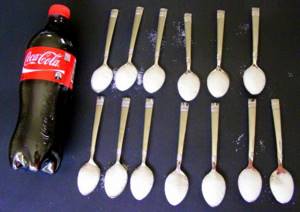
The harmful effects of carbonated, sugar-laden drinks on teeth have long been proven. Phosphoric acid affects tooth enamel like the electrolyte - acid from car batteries (whoever has ever been burned by it or burned through clothes will understand the seriousness of the situation). Of course, you won’t be able to feel all the charm of the effect on your teeth from one glass, but phosphoric acid is harmful to enamel even in small quantities. When thinking about whether Coca-Cola is harmful, consider the harm of similar sugar-rich drinks.
This type of soda is especially dangerous for children’s baby teeth. There are cases when a child had to completely eliminate teeth destroyed by the drink.
Obesity
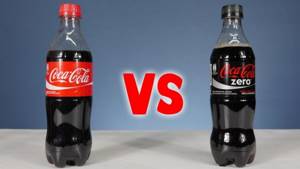
People who abuse Coca-Cola notice that their clothes seem to shrink. We hasten to disappoint you, this is not a low-quality fabric that shrinks after washing, but a banal excess weight that is deposited when consuming large amounts of sugar.
One liter of drink contains 115 grams of sugar, which when calculated per glass will be equal to 40 grams - that’s 8 teaspoons, which is considered the daily norm for an adult. It’s not enough to drink a glass of drink, because then you’ll want more, because sweet soda only increases your thirst.
“Coca-Cola Zero” will not save you from obesity, since instead of sugar it contains a substitute - aspartame. It provokes the deposition of excess fat mass, leads to depression, causes anxiety and migraines, and can cause blindness.
First, the stomach will be rounded, then the hips, cheeks and chest. Is Coca-Cola bad for your figure? The clear answer is yes.
Where does sweetness come from without sugar?
It’s easy to guess that the sweet taste without added sugar comes from sweeteners. In this case, it's aspartame, which is 200 times sweeter than sugar, so only a tiny amount needs to be added to achieve the desired taste. It is called the most well-studied artificial sweetener that mankind has invented.
Aspartame is approved for use in the food industry, but this does not mean it is safe. Proven dangerous effects occur when consuming 40 mg of aspartame for every kilogram of body weight. This means that an adult weighing about 65 kg would overdose if they consumed 20 cans of Coke Zero per day. Few people are able to drink such an amount, but it’s too early to rejoice.
Science is not ready to say that regular consumption of smaller amounts is completely safe for health.
In a number of developed countries, for example, Canada, the sale of diet cola is prohibited. And even the fact that The Coca Cola company recently released a new version of the drink, enriched with vitamins, did not make the Canadian government change its mind. One of the reasons for this relationship is the phenylalanine contained in aspartame. This is an aromatic alpha amino acid, the use of which if intolerant leads to fatal consequences. The formation mechanisms and causes of this intolerance have not been studied at the moment, so use is potentially dangerous for every person.
High blood pressure and cardiovascular diseases

The huge caffeine content in this soda negates all attempts to start leading a healthy lifestyle, quit drinking coffee and smoking. Even with moderate and low physical activity, blood pressure will steadily increase. As a result of such jumps, cardiovascular disease can develop, which will lead to hypertension, heart attack, stroke and other life-threatening illnesses.
If, while taking the drink, you notice poor health and increased heart rate, then give it up completely. Quitting Coca-Cola will help normalize blood pressure and cope with the problem of excess weight.
Is Coca-Cola harmful to health if you drink it in moderate doses and rarely? Like coffee, the drink can be consumed, but only in reasonable portions.
Infertility

As already written earlier, the drink contains substances that have a detrimental effect on the reproductive activity of the body. But have there been studies done to prove this? Perhaps these substances are so scarce that you would have to drink a barrel of Coca-Cola to risk infertility? Is Coca-Cola very harmful? The studies were conducted on male and female volunteers under the age of 30, which is the age for having children. And what did you discover?
- Men who drank a liter or more of this sweet drink a day had a 30% reduction in sperm production.
- The caffeine contained in soda has had a detrimental effect on women's fertility. The likelihood of egg fertilization has decreased, and the risk of premature birth and miscarriage in the earliest stages has increased.
- In addition, the plastic from which drink containers are made is also dangerous. The substances contained in it interfere with reproductive activity.
If you are going to buy soda, choose those in tin or glass cans.
Depression
Coca-Cola is a tonic drink for the body, but with constant consumption of it in large quantities there is a huge risk of developing mental illness.
In 2013, the National Institutes of Health in the drink's homeland conducted a series of studies that proved the connection between depression and addiction to caramel-colored soda.
By the way, the risk of depression and other unstable mental disorders is many times higher among Diet Coca-Cola drinkers.
Benefits of Drinking Diet Coke
Based on the above, it can be understood that Coca-Cola, even light, is a completely unsafe product. However, consuming it in small quantities can sometimes even be beneficial for some groups of people.
By the way, diabetics are deprived of the joy of eating sweet foods. Therefore, they may well occasionally treat themselves to a glass of Coca-Cola Light, which will not raise the level of insulin in the blood.
Nowadays a healthy lifestyle is widely promoted, where proper nutrition and clean water occupy the main place. When eating large amounts of vegetables and fruits, which contain a lot of fiber, a bezoar stone may form in the stomach. Cola can dissolve it. The high acidity of the carbonated drink acts as a stomach acid and can relieve severe abdominal pain, dissolve stones and allow food to be digested. But in this case, it should be used under the supervision of a doctor.
Coca-Cola Light (or Zero) can help you concentrate. A little cola will allow the caffeine to quickly enter the bloodstream and make you feel more alert.
Brittle Bones
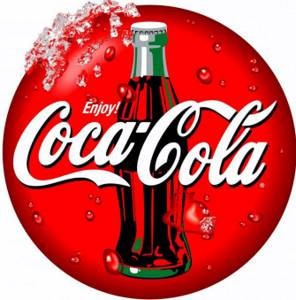
Unfortunately, people only remember the need to take care of their bones in old age, when the damage done to them is so great that it can no longer be repaired. Coca-Cola, when used consistently, leaches minerals from bone tissue, reducing their density. The hip area is especially affected, and people who abuse the drink are more prone to bone fractures and osteoporosis.
The dangers of Coca-Cola and Pepsi for diabetics
— Anna Sergeevna, is it true that other unclassified substances listed on the labels of Pepsi and Coca-Cola are harmful to health, and not only for diabetics?
- Of course it is. And the harm to health will be directly proportional to its current state, namely, the healthier a person is, the less harm will be caused to the body.
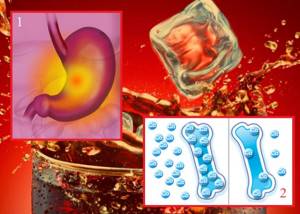
Acidity regulator Orthophosphoric acid (E338) - increases stomach acidity (1), washes calcium from bone tissue (2)
Here is a list of the real effects that a 330 ml can of both sweet and unsweetened Coca and Pepsi Cola drinks gives:
- increases appetite;
- increases the feeling of thirst;
- raises blood pressure and increases heart rate.
In addition, both Pepsi and Coca-Cola have a strong diuretic effect, especially in combination with natural or instant coffee.
Skin problems and premature aging
Is Coca-Cola harmful to the skin and why? Lovers of this sweet drink are simply plagued by problems with the epidermis, these are:
- acne and pimples;
- allergic reactions in the form of rash and redness;
- premature aging.
The last point can be explained by the presence of a large amount of caffeine in the drink - an alkaloid. This substance provokes the adrenal glands to produce more cortisol, the stress hormone. And the production of a hormone that maintains the body’s youth and longevity, dehydroepiandrosterone, leads to the fact that a person looks much older than his age.
A little history
For centuries, the drink has delighted its fans with its unchanged composition and recognizable taste. The bouquet of the drink is unique and its production is kept secret from competitors. Nowadays there is a lot of talk about the dangers of cola, but not everyone knows what exactly its harm is. It is believed that Coca-Cola Light is completely harmless, because it contains no empty calories.
At the beginning of cola production, the ingredients were not only unhealthful, they were simply dangerous. After all, one of the main components was an extract from the leaves of the coca plant. Much later, they learned to make a drug from these same leaves. But at that time, more and more new soda lovers found a refreshing and invigorating drink. Due to the fact that there have been cases of overdose of the soft drink, the recipe was slightly changed. An extract from another part of the plant, which did not contain narcotic substances, was added to the drink.
Oncological diseases

The drink contains, in addition to caramel coloring, a component designated E-150, which contains 4-methylimidazole. This substance releases free radicals that provoke the division of atypical cells in the body.
In addition, Coca-Cola contains cyclamate, a substance banned in many countries. Cyclamate is harmful because it destroys healthy cells in the body.
Most often, lovers of the drink described in the article suffer from malignant tumors of the thyroid gland, liver and lungs.
What processes does cola cause?
A couple of minutes after drinking cola, the sugar contained in a glass of drink deals a deadly blow to the body. The only reason why huge amounts of sugar do not cause vomiting is phosphoric acid, which interferes with the action of sugar. Then there is a sharp increase in insulin in the blood. The liver converts excess sugar into fat.
Caffeine is absorbed a little later. Blood pressure increases, preventing drowsiness. The body begins to produce the hormone dopamine. Phosphoric acid binds minerals in the blood and removes them from the body through urine. The diuretic effect of the drink begins. All water contained in Coca-Cola is removed. And thirst arises.
Digestive system

Surely everyone has heard that with the help of Coca-Cola you can clean even the most dirty and rusty surfaces. Unfortunately, this drink is more suitable for cleaning than for eating.
Soda increases the acidity of the stomach, which with constant consumption leads to the development of gastritis, ulcers, and pancreatic diseases. This drink is prohibited for people who already have any problems with the digestive system.
We figured out the question of whether Coca-Cola is harmful. But only you can answer the question of whether to drink or not to drink!
Cola Zero for weight loss is a dietary product that allows you to enjoy the taste of your favorite drink without the risk of gaining extra pounds. Widely used as a supplement to diet therapy, it is very popular among people who are prone to obesity and who want to maintain good physical shape. But the drink has a number of disadvantages and features.
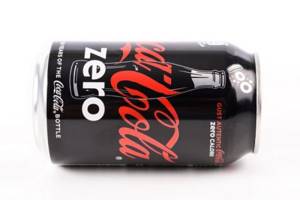
Summarize
Coca-Cola Zero recreates the taste of Coca-Cola Classic without the added sugar or carbohydrates.
This happens by replacing sugar with artificial sweeteners. This means you can drink it without interrupting your state of ketosis.
However, the use of artificial sweeteners is controversial and comes with some health risks. More research is needed in this area, especially in the context of the keto diet.
While Coca-Cola Zero can be an occasional treat to add variety to your ketogenic diet, water is always the optimal choice.
Cola Zero for weight loss is a dietary product that allows you to enjoy the taste of your favorite drink without the risk of gaining extra pounds. Widely used as a supplement to diet therapy, it is very popular among people who are prone to obesity and who want to maintain good physical shape. But the drink has a number of disadvantages and features.
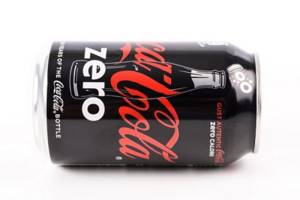
Composition and calorie content
A serving of Pepsi Light (100 g) contains:
- carbohydrates - 10 g;
- protein - 0 g;
- fats - 0 g.
The product does not contain sugar or fat, and is therefore considered safe for your figure. Includes auxiliary components:
- Sodium citrate is a substance that helps stabilize the acid-base balance in the body. In the sports field, it is used to increase endurance and training productivity.
- Phosphoric acid is highly acidic and can negatively affect the condition of tooth enamel. Therefore, it is recommended to drink the drink with clean water or rinse the mouth thoroughly after drinking.
- Caffeine - tones, invigorates, increases the threshold of fatigue and activity. But in large doses it can cause an increase in blood pressure, especially in people with hypertension.

A pleasant taste is achieved thanks to special sweeteners and sweeteners, small amounts of clove and lemon oils, and vanillin. The energy value of 100 g of drink is 0 calories.
The sweeteners themselves are not toxic, but can form toxic substances when boiled or at excessively high temperatures. Drinking a chilled drink completely eliminates such risks.
But, according to some nutritionists, the carbon dioxide present in cola stimulates the production of gastric juice, which can awaken appetite and cause hunger.
Cola zero in most cases also includes an ingredient such as phosphoric acid. This does not affect the process of losing weight, but can cause the removal of calcium from the body, increased bone fragility and the development of diseases of the musculoskeletal system.
Benefits of use
Pepsi light is characterized by the presence of the following beneficial properties:
- increasing energy potential;
- increase in working capacity and endurance;
- elimination of drowsiness, chronic fatigue syndrome;
- general tonic effect;
- accelerated recovery under increased stress (both physical and mental);
- activation of metabolism and metabolic processes;
- increasing stress resistance and adaptive abilities of the body.
It acts like an energy drink, giving a charge of vivacity and strength, improving mood. As for the fight against excess weight, the drink does not have fat-burning properties, and therefore does not help eliminate extra pounds or subcutaneous fat deposits. But due to the fact that cola is sugar-free and has minimal calorie content, when consuming it, there is no risk of gaining weight, even if you drink it in large quantities daily.
When properly consumed in moderate dosages and in combination with other products, diet cola does not cause damage to the body and does not provoke the development of most undesirable consequences. At the same time, the product allows you to reduce the overall calorie content of one meal by approximately 150–200 kcal.
Drink harm
According to nutritionists, cola zero does more harm to the body than good. Among the main disadvantages of the drink are:
- increased risk of developing metabolic syndrome;
- dehydration of the body;
- high probability of developing osteoporosis, arthritis, arthrosis and other joint pathologies;
- formation of stone deposits in the kidney area;
- deterioration of the condition of hair, skin and nail plates (with regular use);
- adverse effects on the condition of the duodenum;
- decreased muscle tone;
- convulsive syndromes;
- irritation of the gastric mucous membranes due to the increased content of carbonic acid;
- negative impact on tooth enamel: development of caries and other dental diseases;
- increased blood pressure;
- attacks of headaches;
- thinning of bone tissue.
Clinical trials have shown that with frequent use of the drink in large doses, the likelihood of developing gastritis, ulcerative lesions of the gastrointestinal tract, the formation of malignant tumors in the stomach, liver and pancreas, leukemia, diabetes, migraines and lymphoma increases.
Drinking Diet Coke is strictly contraindicated for people with health problems such as:
- ulcerative lesions of the gastrointestinal tract;
- gastritis;
- colitis;
- hypertonic disease;
- arterial hypertension;
- renal failure;
- liver dysfunction;
- phenylketonuria;
- increased fatigue
The drink is not recommended for women during the gestational period. The fact is that diet cola contains aspartame, which is extremely harmful to the full development and formation of the fetus.
The product is not suitable for people suffering from sleep disorders, panic attacks, anxiety, irritability, and psycho-emotional instability. Increased caffeine content activates the central nervous system, increasing excitability, hyperactivity, and causing insomnia. To avoid problems with biorhythms, it is not recommended to drink cola in the evening, later than 2-3 hours before going to bed.
Diet Coke and Hunger
It is strictly forbidden to consume diet cola during a cleansing, therapeutic fast. In this case, there is a high probability of developing ulcerative lesions of the gastric tract, because The substances contained in cola stimulate the production of gastric juice necessary for digesting food, and the products themselves do not enter the body. In addition, the drink deprives the body of necessary, vital vitamins and nutrients.
According to most doctors, this product, despite its low calorie content, has the ability to awaken a feeling of hunger. Most often, within an hour after taking the drink, a strong appetite awakens and a desire arises to have a heavy snack, which does not contribute to weight loss. For other people, diet cola, on the contrary, helps curb appetite and provide a long-lasting feeling of fullness.
The sweeteners contained in Pepsi Light reduce levels of the hormone leptin, which is responsible for suppressing hunger, as a result, a person begins to feel hungry and needs more food than usual to feel full. This is due to the fact that artificial sweeteners act on certain brain areas responsible for taste sensations, the body prepares to consume glucose, but does not receive sugar.
The results of clinical studies have shown that in 85% of cases the drink eliminates the feeling of hunger for no more than half an hour to an hour. But when used with other products, such reactions are not observed. Reasonable consumption of the drink in an amount not exceeding 2000 ml throughout the day will help solve the problem. Moreover, it is better to drink cola not on an empty stomach, but after a meal.
Is Diet Coke really that bad?
Nutritionists don't like diet soda, and there is no official recommendation from any association or government that supports it. Although added sugar is one of the main problems of the modern "Western" diet, sweetened sodas are constantly met with something between distrust and hostility, and the ratio of hostility to evidence of harm is not entirely in order. Is diet soda bad for you?
Briefly: no, sweeteners are not harmful if you follow the recommended standards and help you lose weight by reducing caloric intake.
The most important thing to know about low-calorie sweeteners is that you consume them in tiny quantities. Take sucralose: The US Food and Drug Administration has set the acceptable daily intake (which is obtained by determining the safe level and dividing by 100) at 5 mg/kg body weight. If you weigh 70 kg, you can eat 350 mg every day - that’s the amount of sucralose in ~30 standard serving packets of this sweetener. Of course, there are substances that are harmful even in tiny quantities, but science is figuring this out pretty quickly, and no one will allow this to be sold in a supermarket.
The bad reputation of sweeteners began with saccharin when it was linked to bladder cancer in 1970. Then it turned out that this has nothing to do with people, and subsequent studies confirmed this.
There are also concerns about the body experiencing a gap between the sweet taste of food that does not provide energy, as happens with sugar, and what manifestations this has. It has been suggested that this may alter feelings of hunger and satiety, reduce awareness of food calories, negatively impact gut microbiota, increase glucose intolerance, and lead people to consume more calories from other foods. To date, none of these claims about sweeteners have been proven.
First, it's unlikely that tiny amounts of anything can mess up your gut microbiota. Microbiota has become a conspiracy theory in nutrition: it is “where” people go to prove that something is dangerous when in fact there is no evidence for it. Scientists in studies are overfeeding people with fiber in an attempt to change the composition of the microbiota - with limited success. And research on probiotics, which are specifically designed to change gut bacteria, shows that this is difficult to do, even when you deliberately try.
Although gut bacteria and gut dysbiosis are probably the most common problem you hear about, there is exactly one human study. In it, 7 people were fed large amounts of saccharin for a week, and 4 people had "poor glycemic responses", that's all. Pure saccharin in large quantities, 7 people. The remaining studies were conducted on mice. A pure controlled experiment is difficult to do in humans, and then the human gut is in some sense a chaos, and the changes have to be very powerful to be significant and affect different systems of the body.

You also need to understand that even laboratory controlled studies are not always similar (and sometimes not at all similar) to real life. For example, a recent study concludes:
Sucralose may have adverse effects on glucose metabolism in obese people. These studies also highlight the physiological role of sweet taste perception in glucose homeostasis, which supports the idea of moderate consumption of all sweets, regardless of their calorie content.
Ten people with normal weight and nine with obesity took part in the study. None of them regularly consumed sweeteners or had diabetes or significant insulin resistance. Each day of testing differed only in what solution people took on an empty stomach 10 minutes before the oral glucose tolerance test: water (control group), oral sucralose (with the perception of a sweet taste), or injectable sucralose - without the perception of a sweet taste.
Results: “Sucralose has different effects on hormonal responses to oral glucose load in obese and normal weight individuals. Taking sucralose (not just for its sweet taste) increases insulin secretion and short-term decreases glucose in obese people, but not in people of normal weight. These data support the hypothesis that sucralose may have adverse effects on glucose metabolism in obese people, who are the group most frequently consuming sweeteners for weight control. These data also highlight the physiological role of sweetness perception in glucose homeostasis, which supports the idea of moderate consumption of sweets, regardless of their caloric content.
This is a useful study for science, which helps to better understand what is happening with glucose metabolism. But taking high doses of pure sucralose on an empty stomach, including by injection, is not something that happens in real life (although drinking liters of diet soda on an empty stomach in the morning is not a good idea anyway). A similar story is with fructose. Rodent studies show that solutions with high doses of pure fructose lead to obesity and other problems in rodents. But the experimental doses are so high that they have nothing to do with a person's consumption of fruit - during the day, on an empty stomach or at night.

This is not a call to switch to sweeteners. But if there is any evidence that they can help with weight loss a little (and there is no evidence of harm for legal sweeteners at recommended dosages), there is no point in being so hostile to them.
Rather, it's because sweeteners represent almost everything that's wrong with our diets:
- they are mostly synthetic;
- they play on people's love for sweets, which manufacturers use to sell us more and more;
- They are found mainly in ultra-processed foods, which are recommended to be eaten less frequently.
If we summarize all the official recommendations on proper nutrition and translate them into human language: you should not eat too much, mostly plants. Eat home-cooked food and drink water. But given how far people are from this, should we allow “perfect” to be the enemy of “normal”? The fact is that many people don't want to drink water, they want to drink soda.
Consider the most recent meta-analysis published in the British Medical Journal. “There was no convincing evidence of benefit, but potential harm cannot be ruled out.” But we can say the other way around: there is no convincing evidence of harm, and benefit cannot be excluded. The meaning is the same, but it sounds more positive. Almost similar things can be found for any substance. For example, take caffeine: everyone wants to find out what’s wrong with it. Go to PubMed, a repository of scientific articles, and look at human studies. Ignore anything industry sponsored. You'll find plenty of lists of potential harms, but once you sift through the speculation and focus on the evidence, you won't find much to worry about.
Here is a comprehensive literature review published in the scientific journal Food and Chemical Toxicology in 2021. Conclusions:
- There is no negative impact of long-term use of sucralose on health or glycemic parameters in healthy and diabetic patients.
- The permitted daily intake of sucralose remains significantly below the acceptable daily value.
- The review confirms the findings of regulatory authorities worldwide that sucralose is safe for its intended use as a non-nutritive sweetener.

Sugar consumption has been declining since 1999, but obesity continues to rise. When we look at population-based observational studies, we see that sweetener drinkers tend to weigh more and have poorer health. But today, all studies showing the connection between sweeteners and obesity in people are observational, not controlled. This means that only a relationship has been found between two variables: obese people drink Diet Coke more often and more, but such studies do not prove that Diet Coke is the cause of obesity.
Diet soda drinkers are more likely to be overweight due to poor eating habits and other factors. For example, some people drink Diet Coke to at least somehow whiten their poor diet, which leads to obesity. Others think they can afford more calories in their food because they drink Diet Coke—and end up overeating. There is a connection, but not cause and effect. Diet Coke doesn't make you fatter, it's just that obese people tend to drink Diet Coke.
Conversely, the fact that the use of sweeteners in a healthy lifestyle is discouraged may mean that people who care about health and have good habits do not use them. Almost the same as with vitamins in jars: health is associated with more healthy habits, and dietary supplements and vitamins, like a bottle of clean water with you everywhere, are attributes of a healthy lifestyle.
When we look at controlled studies, by replacing sugar with non-nutritive sweeteners, people consume fewer calories and lose weight over time. The results are not very significant, but to date there is not a single dietary intervention known that would have a wow effect for the treatment of obesity on its own, in isolation, not in combination with other interventions.
If the nutrition community encouraged obese people with very poor eating habits to switch from sugary soda to just a few liters of clean water, but to at least a non-calorie soda, it might be more effective and viable.
The US Department of Health monitors people who have lost more than 15 kg and were able to maintain the new weight for at least a year. Only 10% of them report drinking sugar-sweetened beverages regularly, while 53% drink diet soda regularly. Compare this to the general population, where 61% drink sugar-sweetened soda every day and only 15% drink the diet version. Everyone knows that drinking clean water is good for you, but soda is not. But people still drink soda, so the lesser evil is to drink zero-calorie soda.
Coca Cola Light and diet
Diet cola is often used as an adjunct to diet therapy. First of all, the drink allows you to relieve the stress that accompanies a diet and facilitate the process of losing weight, because. a person gets the opportunity to take something sweet and tasty, but at the same time low-calorie. These qualities of the drink strengthen motivation, improve mood, help avoid breakdowns and adhere to the recommended diet for a long time.
But it is important to understand that the drink itself will not have an effect in losing weight. Therefore, if you want to get rid of excess weight, subcutaneous fat, and eliminate cellulite, you will need to follow a proper balanced diet, excluding sweets, baked goods, fast food, fatty and fried foods from your daily diet. Regular sports and physical activity will allow you to achieve more pronounced, faster and more stable results.
Reviews from nutritionists indicate that cola zero is ineffective during diet therapy, and if abused, it can even cause harm to health and provoke unwanted reactions. The drink can only be used to improve the psycho-emotional state, when sticking to a diet becomes very difficult. You need to drink it in minimal quantities, and after meals.
Because Diet cola causes different reactions in people (for some it suppresses hunger, for others it stimulates), it is worth trying the drink at the beginning of a diet. If unpleasant symptoms are detected, it is recommended to stop using it further, replacing it with natural juices, green tea or simply boiled, still mineral water.
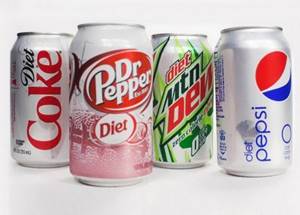
Reviews
Valeria, 22 years old, Moscow
I only drink Pepsi Light - the taste and price are similar, but the product does not contain extra calories and fat. I haven’t used this drink as a means of losing weight, I just prefer it for keeping in good shape, because... I watch my figure.
Svetlana, 30 years old, Volgograd
A month ago I was on a strict diet. I am a big fan of sweets, so I decided to diversify my diet a little with cola, choosing a diet one. This drink may not help you lose weight, but it supports you well during a diet and makes the process of losing weight more comfortable. I drank cola after eating, so I didn’t feel any strong hunger after drinking it. As a result of the diet, I managed to lose 6 kg.
Natalya, 27 years old, Tula
I drank diet cola when I decided to lose weight and adhere to the principles of a healthy diet. But then, after reading all the possible side effects, I decided to give up the drink. Moreover, I myself noticed that literally an hour after drinking a portion of a light drink, my appetite increases, as does my craving for sweets.
“Unsweetened” advice for diabetics with type 2 pathology
— Anna Sergeevna, what recommendations will you give to readers of our site regarding the use of sugar substitutes and drinks in which added sugar is replaced with sweeteners?
Weaning off sweets occurs within 3 months, but addiction occurs immediately, and the brain does not care at all whether the sweets contained fast carbohydrates or were sugar substitutes. Alas, only healthy young people can safely take sugar substitutes and only for a short time, for a time when they need to lose a couple of extra pounds.
My advice to people with type 2 diabetes who are serious about their treatment and following a low-carb or keto diet is to avoid any drinks, foods, or prepared meals labeled “diet” and/or “diabetic friendly.”
On a note. Any carbonated water, mineralized or not, without syrups, relieves the craving for alcohol, smoking, and somewhat dulls the appetite.
Well, if you had to drink a glass of Pepsi or Coca-Cola on a holiday, then you need to compensate for this pleasure by drinking 1 liter of mineral water for 1.5–2 hours.
In the final video in this article, healthy lifestyle expert Igor Tselenchuk, who in 2021 received the title of Master of Physical Therapy at the Massachusetts Institute of Health Professions at the MGH Institute of Health Professions, expresses his opinion on alcoholic and non-alcoholic drinks for type 2 diabetes.










